Airvent
Vapour releasing syrup to open the airways, rich in vitamin C and essential oils for optimal air flow
View ProductMost horses will cough occasionally if they ingest foreign material into their airways while eating, drinking, or at the start of exercise. Coughing is their body’s natural response to maintain clean airways. But why do horses cough persistently, and how can we tackle it?
A cough signals irritation in the horse’s respiratory system. Several factors can cause a horse to cough, and asking some key questions can pinpoint its cause:
– How often does my horse cough and for how long?
– Is there nasal discharge with the cough?
– Are other horses nearby also coughing?
– Has my horse recently eaten or travelled?
– Are there any other visible clinical signs?”
Occasional coughing is typically harmless. However, persistent coughing or when coupled with other clinical signs may indicate a more significant respiratory issue.
A dry cough in horses means there is an absence of phlegm, while nasal discharge suggests an overproduction of mucus or phlegm related to the respiratory condition
A whole yard or barn filled with coughing horses is often a sign of a virus spreading among them, like influenza or herpes (EHV). If only one horse is coughing in a yard, it’s less likely to be infectious.
Food particles, particularly dusty preserved forages, can irritate the airways. If your horse suddenly starts coughing after eating and shows signs like neck spasms, nasal discharge with food material, and signs of distress, it may be a sign of choke, which occurs when food becomes lodged in the horse’s oesophagus. While not a respiratory issue, it can be a frightening experience and potentially lead to serious aspiration pneumonia. If you suspect your horse has choke, stay calm, remove all food sources (including edible bedding) and water, and promptly contact your veterinarian for guidance.
If your horse develops a cough following a period of travel, it’s crucial to consult your veterinarian, particularly if it accompanies additional symptoms like fatigue or fever. The cough may be a result of a viral infection contracted from another horse at an event or during transportation. Another potential cause is Shipping Fever (bacterial pneumonia), which affects horses that have endured long journeys and is often linked to stress (refer below for additional information)
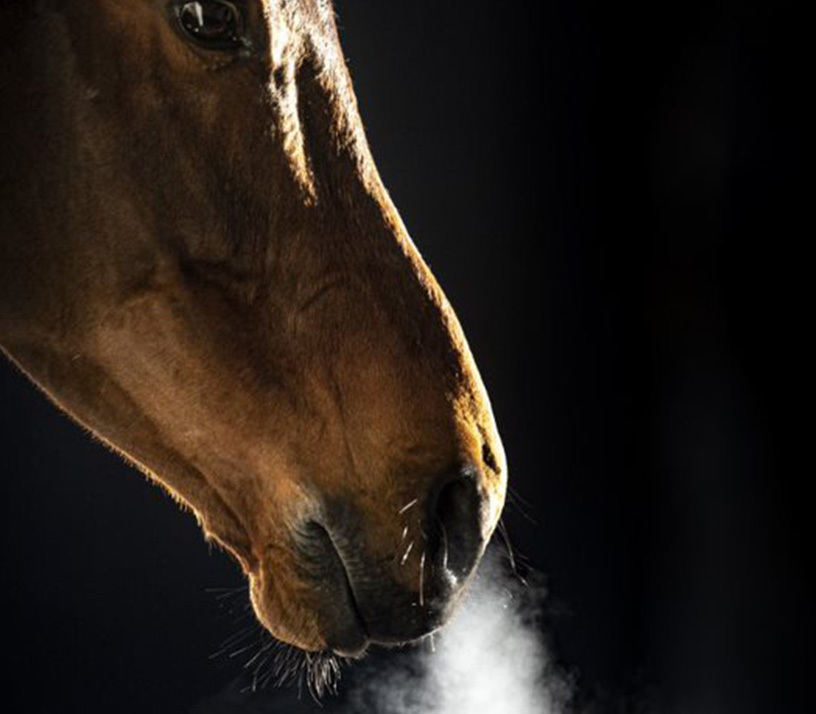
If your horse exhibits a cough in conjunction with other signs like fatigue, loss of appetite, elevated temperature, or decreased performance, it’s essential to contact your veterinarian for a thorough evaluation. Your horse could be facing a significant illness, and your vet will conduct a complete physical exam and diagnostic assessment to determine the most suitable treatment plan.
Does the coughing occur during exercise, while in the stable, or at certain times of the year? Recognizing when your horse coughs the most can assist in pinpointing the root cause
A persistent cough, especially when accompanied by symptoms like nasal discharge, lethargy, fever, reduced performance, or when it affects multiple horses in the same location, should prompt a thorough investigation by your veterinarian. The diagnostic process may encompass:
– Listening to your horse’s chest, perhaps performing a “rebreathing exam”
– Conducting blood work
– Collecting nasal swabs
– Performing an endoscopic examination
– Carrying out tracheal or lung washes
– Utilizing ultrasound
These tests are crucial in achieving a definitive diagnosis and determining the most appropriate treatment plan.
Some common causes of coughing in horses include:
– Equine influenza
– Equine herpes virus
– Strangles
– Recurrent airway obstruction
– Exercise induced pulmonary haemorrhage
– Lungworm
– Shipping fever
– Ascarids
– Rhodococcus equi
Equine influenza: Despite vaccination, influenza (flu) remains a prevalent source of respiratory infections and coughing in horses. Vaccines significantly reduce the incidence and severity of flu, but no vaccine is 100%. Influenza spreads quickly among horses kept in proximity. Influenza typically presents with an elevated temperature and decreased appetite. In unvaccinated horses, influenza infection can be prolonged and potentially life-threatening.
Equine herpes Virus(EHV): This is an underlying reason for coughing and the presence of clear nasal discharge in young horses. This virus can rapidly transmit to all horses that haven’t been previously exposed within the same premises. Typically, it manifests as a mild infection, occasionally leading to elevated temperatures and decreased feed consumption. Vaccination is an effective measure for lowering the occurrence of EHV in a stable. Some forms of EHV can also cause neurological issues and abortion.
Strangles: This is still one of the most common respiratory infections in horses, resulting from the highly contagious bacterium Streptococcus equi. Strangles spreads swiftly through contaminated exudates, such as nasal discharge, affecting all horses within a shared environment. Common clinical signs include elevated body temperature, decreased appetite, nasal discharge, coughing, and enlarged lymph nodes (glands). In many cases, these swollen glands rupture, discharging pus onto the skin. Strangles can be a nightmare for any horse yard. 10 % of cases are complicated and can have a mortality rate of up to 40%. Some horses can become dormant carriers that only shed the infection in periods of stress.
Recurrent airway obstruction (RAO): Also recognized as equine asthma, heaves, or chronic obstructive pulmonary disease (COPD), this condition is a frequent cause of coughing in older horses. It arises from an allergic reaction in the horse’s lungs to environmental irritants. Common irritants include dust, fungal spores, or pollen. As a result, RAO is more prevalent in dusty environments, like the dry arid climate of the Middle East. This allergic response leads to increased mucus production and a narrowing of the airways, making the horse more prone to coughing. Equine asthma doesn’t spread among horses, and affected horses exhibit abnormal respiratory signs, even at rest.
However, in young horses, a similar condition, known as inflammatory airway disease (IAD) is often associated with poor performance, exercise intolerance, and intermittent coughing—these horses typically appear normal at rest.
Read more about RAO.
Exercise induced pulmonary haemorrhage(EIPH): This condition, commonly referred to as ‘bleeding’, is predominantly observed in racehorses. While most horses affected by EIPH do not exhibit a bloody nasal discharge, coughing is frequent as the horse tries to expel blood from its airways. It is a very severe case if blood reaches the nostrils as the bleeding is coming from the horse’s lungs.
Read more about EIPH.
Glanders: Clinical signs of chronic glanders in horses include coughing; weight loss; ulcers and nodules on the nasal mucosa; enlarged submaxillary lymph nodes; chronic enlargement and induration (hardening) of lymphatics and lymph nodes; joint swelling and painful leg oedema (fluid swelling); and nodules, particularly on the legs, that rupture, release pus, and ulcerate. It is a devastating disease caused by the bacteria Burkholderia mallei. Glanders can be transmitted to humans. It is eradicated in a lot of countries in the world but there have been a few cases reported in the Middle East. If suspected, you must call your veterinarian immediately.
Lungworm: An infection affecting the lower respiratory tract, often leading to bronchitis or pneumonia, is attributed to the parasitic roundworm Dictyocaulus arnfieldi. Lungworm infestations in horses are uncommon, primarily occurring when horses share pastures with donkeys, which are the primary host for these parasites.
Shipping Fever:Shipping fever, a bacterial pleuropneumonia, can develop when a horse is unable to lower its head for extended periods, preventing the clearance of mucus, dirt, and debris from its airways (e.g., when tied up during long-distance transport). If left unattended, shipping fever can pose a life-threatening risk.
Ascarids: Typically, this issue primarily affects horses younger than three years old. Equine roundworms, known as Parascaris equorum, initially infest the gut before migrating to the lungs, causing significant inflammation. In older horses, immunity develops against these roundworms, making them an uncommon cause of coughing in mature equines
RhodococcusEquipneumonia: Rhodococcus equi is a soil-dwelling bacterium capable of inducing pneumonia in foals aged between 1 and 6 months. Foals contract this illness by inhaling dust particles contaminated with the pathogen. Once Rhodococcus equi has taken root in the soil, its eradication becomes nearly impossible, posing an enduring threat to successive generations of foals. It is highly prevalent in dustier environments.
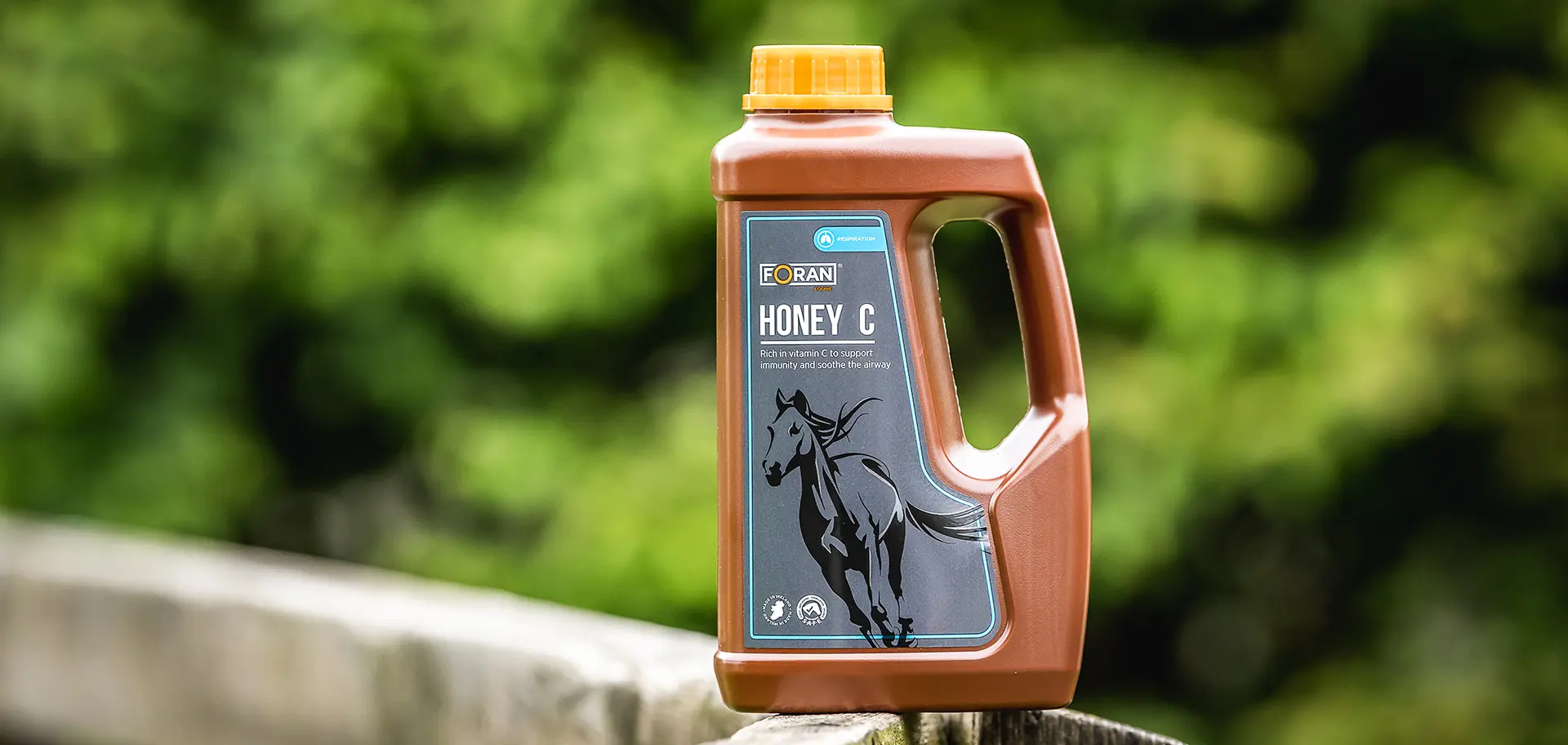
Given the various potential causes of a horse’s cough, there exists a wide range of treatment options. Typically, a coughing horse will require rest, with a general guideline being to provide two days of rest for every day of coughing for horses affected by conditions like influenza, herpes, or strangles. However, it’s essential to consult your veterinarian since prematurely resuming riding when the airways haven’t fully recovered can be detrimental. Your vet will also assess whether your horse requires prescription medications such as anti-inflammatories or antibiotics.
Several management changes can help reduce the risk of respiratory diseases:
– Stay up to date with vaccines and deworming programmes. Consult your vet for guidance.
– Minimize dust in your horse’s environment. Ensure proper stable ventilation, use dust-free bedding, and consider soaking or steaming hay to reduce the inhalation of fungal spores. Avoid turning out your horse in excessively dusty conditions.
– Maintain good hygiene on the premises. Isolate a horse that starts coughing suddenly until an infectious cause can be ruled out. Regularly monitoring rectal temperatures can also aid in early problem detection.
Additionally, using a scientifically formulated supplement for coughing can be beneficial for supporting and maintaining your horse’s respiratory health:
Airvent Syrup & Gel, our respiratory supplement for horses contains Vitamin C to support immune and respiratory function, along with soothing ingredients like honey, peppermint, and eucalyptus to help open airways for easier breathing.
Honey C our vitamin C supplement for horses is a palatable syrup with honey and Vitamin C to aid immune and respiratory function, as well as herbs like thyme, liquorice, and horehound known for their respiratory support properties, particularly during times of stress or illness.
For high-performance horses, Zosfor is designed to support respiratory and blood vessel health with hesperidin, Vitamin C, and Vitamin K.
It’s important to note that if your horse displays any signs of respiratory problems, you should seek veterinary advice to address any underlying conditions before adding a respiratory supplement to their diet.
For further inquiries or assistance with your horse’s health concerns, please don’t hesitate to contact the Foran Equine team.
References:
Deaton, CM. Marlin, D,J. Roberts, CA. Smith, N. Harris, PA. Kelly, FJ. And Schroter, RC. Antioxidant supplementation and pulmonary function at rest and exercise. Equine Veterinary Journal Supplement. 2002 Sep;(34):58-65
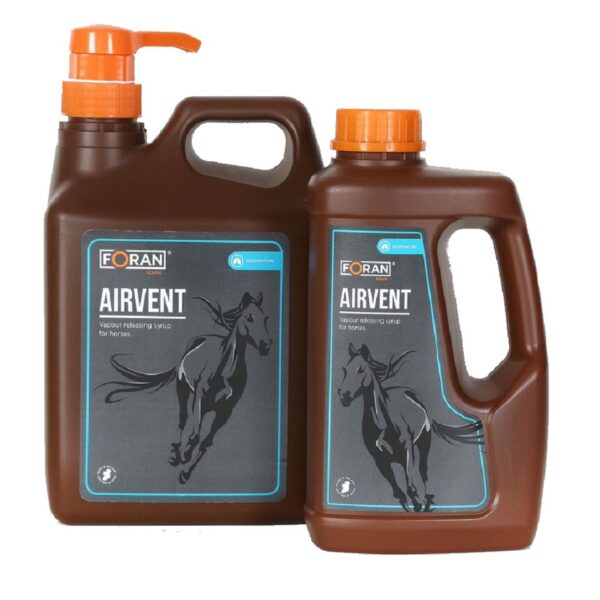
Vapour releasing syrup to open the airways, rich in vitamin C and essential oils for optimal air flow
View Product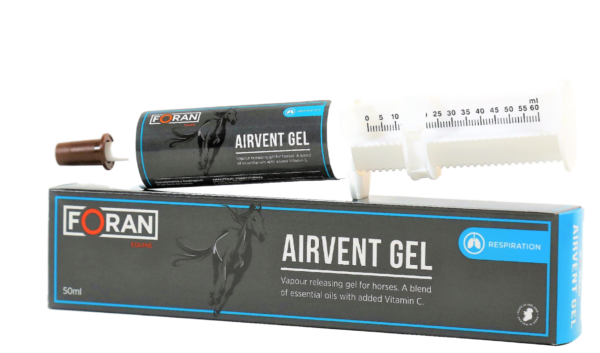
Vapour releasing gel to open the airways, when optimal air flow is needed most
View Product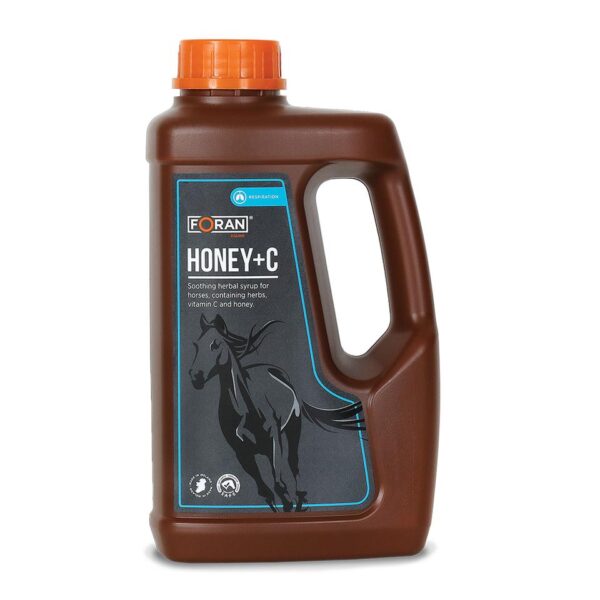
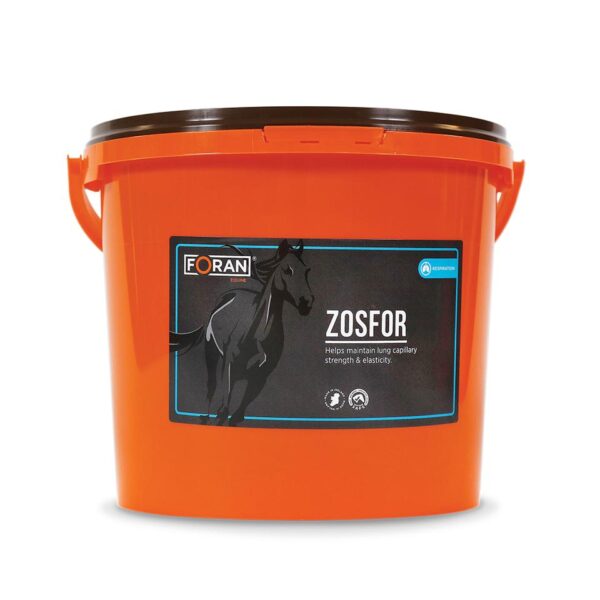

Group Commercial Manager GCC Region
Based in the UAE, Nicolas Gaumerais is the Commercial Manager of the Connolly's RED MILLS Group which includes Foran Equine supplements and Connolly's RED MILLS horse feed in the GCC region. Nicholas regularly travels across the Gulf.